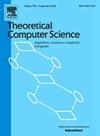关于洗牌和分裂自动机
IF 1
4区 计算机科学
Q3 COMPUTER SCIENCE, THEORY & METHODS
引用次数: 0
摘要
我们考虑了一类有限状态的三带传感器,它模拟了单词的洗牌和分裂操作。我们将它们表示为所谓的变换单oid上的自动机。这些自动机可以被看作是洗牌者或分裂者。我们证明了分配器的功能是可判定的,同时也证明了功能分配器之间的等价是可判定的。此外,在确定性情况下,等效算法是对分裂器状态数的多项式。本文章由计算机程序翻译,如有差异,请以英文原文为准。
On shuffling and splitting automata
We consider a class of finite state three-tape transducers which models the operation of shuffling and splitting words. We present them as automata over the so-called Shuffling Monoid. These automata can be seen as either shufflers or splitters interchangeably. We prove that functionality is decidable for splitters, and we also show that the equivalence between functional splitters is decidable. Moreover, in the deterministic case, the algorithm for equivalence is polynomial on the number of states of the splitter.
求助全文
通过发布文献求助,成功后即可免费获取论文全文。
去求助
来源期刊

Theoretical Computer Science
工程技术-计算机:理论方法
CiteScore
2.60
自引率
18.20%
发文量
471
审稿时长
12.6 months
期刊介绍:
Theoretical Computer Science is mathematical and abstract in spirit, but it derives its motivation from practical and everyday computation. Its aim is to understand the nature of computation and, as a consequence of this understanding, provide more efficient methodologies. All papers introducing or studying mathematical, logic and formal concepts and methods are welcome, provided that their motivation is clearly drawn from the field of computing.
 求助内容:
求助内容: 应助结果提醒方式:
应助结果提醒方式:


